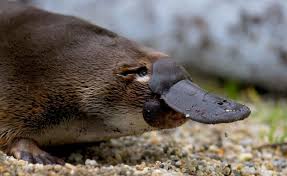
中文词源
platypus 鸭嘴兽
来自希腊语platypous,宽脚的,来自platys,宽的,词源同plate,pous,脚,词源同foot.后用于鸭嘴兽这种动物,因其脚宽而得名。
英语词源
- platypus
-
platypus: [18] The platypus’s name means literally ‘flat-footed’. It was given to it at the end of the 18th century, and is first recorded in George Shaw’s Naturalists’ Miscellany 1799. It was adapted from Greek platúpous, a compound formed from platús ‘flat’ (source of English place, plaice, and plane the tree) and poús ‘foot’ (a relative of English foot).
=> foot, place, plane, plate - platypus (n.)
- Australian duck-mole, 1799, from Modern Latin, from Greek platypous, literally "flat-footed," from platys "broad, flat" (see plaice (n.)) + pous "foot," from PIE root *ped- (1) "a foot" (see foot (n.)).
Orig. the generic name, but, having already been given to a genus of beetles, it was in 1800 changed for Ornithorhyncus. [OED]
权威例句
- 1. One of the mascots was the platypus.
- 吉祥物一是鸭嘴兽.
- 2. At home both in water and on land, the platypus is amphibious.
- 鸭嘴兽的家可以在水中,也可以在陆上.它是两栖动物.
- 3. Not many people could describe a platypus because few have seen one.
- 很少有人能描述鸭嘴兽,因为几乎没有人见过它.
- 4. For this reason, scientists know less about the platypus than they would like to know.
- 因为这个原因, 科学家对它知之甚少.
- 5. Researchers just mapped the genome of a female platypus from Australia.
- 最近,研究人员们为一直来自澳大利亚的雌性鸭嘴兽绘制了基因图.